What Really Happens To Your Body When You Take Alka-Seltzer
When you experience heartburn or indigestion, you usually reach for an antacid to make yourself feel better. One of the most popular antacids on the market is Alka-Seltzer. This product comes in multiple forms including gummies, chews, and effervescent tablets that are added to water. How exactly does this medicine relieve uncomfortable symptoms caused by overindulging in certain foods or beverages?
While some Alka-Seltzer products contain aspirin to relieve pain, this brand's main feature is working as an antacid. Antacids neutralize stomach acid, which can cause uncomfortable symptoms like heartburn and indigestion when too much of it builds up in the body (via MedlinePlus). Alka-Seltzer's effervescent tablets are its most well-known product. These contain sodium bicarbonate (baking soda) and citric acid. Those ingredients react when added to water and produce a fizzing effect. In your stomach, this mixture temporarily neutralizes your stomach acid and provides relief from those nagging symptoms.
Constipation, gas, and burping are common side effects of Alka-Seltzer (via WebMD). Some serious, but rare, side effects include nausea, vomiting, loss of appetite, and unusual tiredness. See your doctor if you experience any of these symptoms.
There are many potential causes of too much stomach acid
Stomach acid is necessary to help you digest your food. However, sometimes too much acid is produced. High-acid foods can contribute to the acid in your stomach and give you uncomfortable symptoms. These include coffee, chocolate, citrus fruits, tomatoes, alcohol, and fried foods (via Livestrong). Taking an antacid like Alka-Seltzer after eating these foods can help relieve those symptoms.
If you experience symptoms like stomach pain, heartburn, nausea, vomiting, and diarrhea regularly, you may have an underlying health condition like high stomach acid. This occurs when there is an overproduction of stomach acid in your system (via Healthline). Zollinger-Ellison syndrome, which is a rare condition where tumors form on the pancreas and small intestine, can lead to high stomach acid. Chronic kidney failure can also lead to overproduced stomach acid, as well as being on dialysis frequently.
High stomach acid can lead to ulcers, gastroesophageal reflux disease, and gastrointestinal bleeding. Talk to your doctor if you are experiencing any of the symptoms mentioned above.


